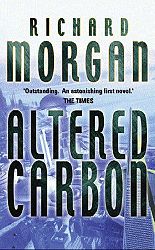
Altered Carbon
Richard Morgan
534 pages
published in 2002
Altered Carbon is Richard Morgan's first novel. It made a strong impression, winning the Philip K. Dick Prize for best novel in 2003, as well as being optioned by Joel Silver, the sale of the movie rights enabling Morgan to become a fulltime writer. Since then Morgan has written several more novels, part of the same generation of British science fiction writers as Alastair Reynolds, Neal Asher and Jon Courtenay Grimwood. I knew of him, but had not read anything of his until last year, when I read Altered Carbon and was sucked in from the first page. So not for the first time I started a series in the wrong way, as that was actually the sequel to this book -- not that it mattered, as all they shared was the hero, Takeshi Kovacs.
Whereas Altered Carbon was a Dirty Dozen type war romp with the cynicsm turned up to eleven, Altered Carbon is more of a Chandleresque film noir story. It starts with Takeshi as amercenary on Harlan's World being caught and killed in a police dragnet, to wake up on Earth minus one partner and forced to solve the murder of Laurens Bancroft, which everybody but the murder victim in question thinks is suicide. If Takeshi refuses to cooperate or fails in his task he'll go back in storage for the next couple of centuries or so.
In Morgan's future everybody can have their personality downloaded into computer storage, then uploaded into another body --or "sleeve". For the rich, this is their ticket to virtual immortality, as they can, like Bancroft, keep various clones in storage and upload their memories each night into off-site storage. If they're killed they'll at most lose a couple of hours of memory, nothing more. For the poor it's another matter. They're stuck in their own body, but can be convicted towards so many years or even centuuries of storage if convuicted of a crime, during which time their body might be rented out to anybody needing or wanting a new sleeve, and with no guarantee that they will ever get their own body back. Indeed, Takeshi's new body isn't his own either, but that of the nearest poor sod available -- or is it?
Meanwhile there are also those who, like the Catholic Church, reject the concept of sleeving all together. For devout Catholics consciousness down- and uploading is a sin, so if they die, they die forever; they can't even be resurrected in virtual reality. This of course makes them easy targets for criminals, as they can't testify against you post-mortem... As Takeshi finds out once he dives into the sleezy underworld of Bay City, many of the lowest rungs in the criminal classes are occupied by easily disposed off Catholics.
Even before Takeshi starts his investigation he finds hints that the suicide consensus about Bancroft's death might not be the real truth, as he is ambushed on the way back to his hotel from his first meeting with Bancroft, by people who know what he looks like and who he is. Waht's more, once he starts in earnest, he keeps encountering people who seem to think they know him, though not as Takeshi...
As per usual in this kind of story, all the dots are slowly connected, with a little help of the old ultraviolence, not to mention a very uncomfortable to read torture scene when Takeshi is captured and interrogated for his supposed knowledge. Morgan keeps most of the latter off the page, but the little he shows is disturbing enough, the moreso as it all takes place in v.r., which, as he explains, means you can torture somebody to death multiple times in less time it takes to read this sentence and don't need to worry about keeping them in a good enough shape to answer your questions....
Altered Carbon works well, both as a thriller mystery and a science fiction novel, though might be a bit too padded for some tastes. It's definitely a book to avoid if you're sensitive to descriptions of violence or torture, even if none of it is gratitious.